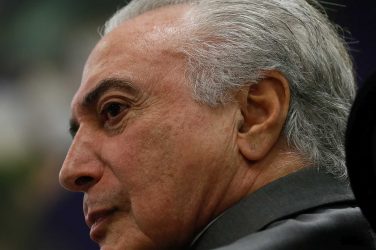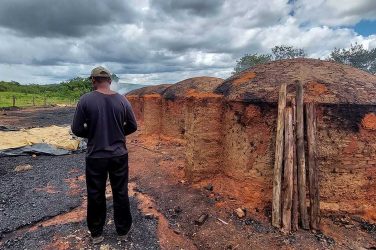Brazil ranks 79th among 176 countries in a world ranking of perceived corruption released by Transparency International this January 25. The scoring scale used by the corruption watchdog ranged from 0 (“highly corrupt”) to 100 (“very clean”).
Brazil scored 40 in the Corruption Perceptions Index – two points higher than in the previous year – but still slipped three positions down from its 76th place in 2015. Brazil had the same score as Belarus, China, and India.
Denmark and New Zealand had the highest scores (90) and lead the ranking as the least corrupt countries, whereas Somalia was the country with the worst corruption score (10). The global average was 43 points, which according to Transparency International indicates “endemic corruption” in the countries’ public sector.
In the regional analysis for the Americas, the survey cited a number of corruption scandals in such countries as Panama, Argentina, Chile, and Brazil. But for Transparency International, sometimes there is an upside to the bad news.
“It is not always bad to have headlines about corruption. From the Panama Papers in April to the record US$ 3.5 billion Odebrecht settlement in Brazil in December, 2016 was a good year in the fight against corruption in the Americas,” the analysis read.
US$ 1.6 Million Recovered
The Department of Asset Recovery and International Legal Cooperation of the Brazilian Ministry of Justice repatriated US$ 1.6 million in January, which has been deposited to bank accounts of offshore companies in Switzerland on the name of João Procópio Junqueira de Almeida Prado. He acted as middleman of currency dealer Alberto Youssef, and was arrested in Operation Car Wash.
According to the Ministry of Justice, Procópio signed a plea bargain agreement in May 2015 with the Federal Prosecution Service and Car Wash task force, and pledged to repatriate the money deposited to bank accounts of several offshore companies held in the PKB Privatbank SA, which are controlled by him in Swiss banks.
The ministry has also reported that, in addition to recovering assets, it also obtained bank documents from companies that may aid investigations into a corruption scheme in Petrobras contracts probed under Operation Car Wash.
The request for international legal cooperation for the repatriation of money was made by the Prosecutor General’s Office(PGR) in Paraná, in November 2015.
The bank accounts of offshore companies were used to pay bribes to civil servants, parties, and political agents.
According to the PGR, 126 international cooperation agreements have been signed with 33 countries due to Operation Car Wash, launched three years ago. In contrast, Brazil received requests from 17 countries demanding Brazil’s cooperation for their investigations related to the case.
Until the end of last year, actions related to the operation filed in the Federal Supreme Court (STF) resulted in the repatriation of US$ 25 million. Forty-one plea bargain agreements were approved by the Court.
For actions taken by the lower court, US$ 3.191 billion are being recovered, of which US$ 239 million have to be repatriated.
Public Debt
The Federal Public Debt, which includes both domestic and external debt, closed out at US$ 983.6 billion in 2016, the National Treasury reported.
The figures are within the range estimated by the Annual Borrowing Plan (PAF in the Portuguese acronym) for 2016 (US$ 983 billion–US$ 1.042 trillion). In 2015, the year-end federal public debt was $882.49 billion.
Domestic Federal Public Debt, the amount of debt outstanding in the domestic market, increased from US$ 837.31 billion to US$ 943.47 billion, whereas the External Federal Public Debt stock decreased from US$ 45.11 billion to US$ 39.96 billion.
The Treasury estimates that the Federal Public Debt could reach $1.15 trillion this year.
From Transparency International:
2016 showed that around the world systemic corruption and social inequality reinforce each other, leading to popular disenchantment with political establishments and providing a fertile ground for the rise of populist politicians.
69 per cent of the 176 countries on the Corruption Perceptions Index 2016 scored below 50, on a scale from 0 (perceived to be highly corrupt) to 100 (perceived to be very clean), exposing how massive and pervasive public sector corruption is around the world. This year more countries declined in the index than improved, showing the need for urgent action.
Corruption and inequality feed off each other, creating a vicious circle between corruption, unequal distribution of power in society, and unequal distribution of wealth.
As the Panama Papers showed, it is still far too easy for the rich and powerful to exploit the opaqueness of the global financial system to enrich themselves at the expense of the public good.
“In too many countries, people are deprived of their most basic needs and go to bed hungry every night because of corruption, while the powerful and corrupt enjoy lavish lifestyles with impunity,” said José Ugaz, Chair of Transparency International.
“We do not have the luxury of time. Corruption needs to be fought with urgency, so that the lives of people across the world improve,” added Ugaz.
Grand corruption cases, from Petrobras and Odebrecht in Brazil to Ukrainian ex-President Viktor Yanukovych, show how collusion between businesses and politicians denies national economies of billions of dollars of revenues that were siphoned off to benefit the few at the expense of the many. This kind of systemic grand corruption violates human rights, prevents sustainable development and fuels social exclusion.
Brazil’s score on the index, for example, has significantly declined compared to five years ago as one corruption scandal after another involving top politicians and businesspeople was uncovered. Yet the country has shown this year that through the work of independent law enforcement bodies it is possible to hold to account those previously considered untouchable.
People are fed up by too many politicians’ empty assurances to tackle corruption and many are turning towards populist politicians who promise to change the system and break the cycle of corruption and privilege. Yet this is likely to only exacerbate the issue.
“In countries with populist or autocratic leaders, we often see democracies in decline and a disturbing pattern of attempts to crack down on civil society, limit press freedom, and weaken the independence of the judiciary. Instead of tackling crony capitalism, those leaders usually install even worse forms of corrupt systems,” said Ugaz.
“Only where there is freedom of expression, transparency in all political processes and strong democratic institutions, can civil society and the media hold those in power to account and corruption be fought successfully.”
The index scores of Hungary and Turkey – countries that have seen the rise of autocratic leaders – have dropped in recent years. In contrast, the score of Argentina, which has ousted a populist government, is starting to improve.
Technical fixes to specific anti-corruption legislation are not enough. What is urgently needed are deep-rooted systemic reforms that even up the growing imbalance of power and wealth by empowering citizens to stop the widespread impunity for corruption, hold the powerful to account, and have a real say in the decisions that affect their daily lives.
These reforms must include the disclosure through public registries of who owns companies as well as sanctions for professional enablers who are complicit in moving corrupt money flows across borders.
The Corruption Perceptions Index 2016 covers perceptions of public sector corruption in 176 countries. Click here for the full index.
Denmark and New Zealand perform best with scores of 90, closely followed by Finland (89) and Sweden (88). Although no country is free of corruption, the countries at the top share characteristics of open government, press freedom, civil liberties and independent judicial systems.
For the tenth year running, Somalia is the worst performer on the index, this year scoring only 10. South Sudan is second to bottom with a score of 11, followed by North Korea (12) and Syria (13). Countries at the bottom of the index are characterized by widespread impunity for corruption, poor governance and weak institutions.
Countries in troubled regions, particularly in the Middle East, have seen the most substantial drops this year. Qatar is the biggest decliner compared to the 2015 index with a drop of 10 scores. “The FIFA scandals, the investigations into the decision to host the World Cup in 2022 in Qatar and reports of human rights abuses for migrant workers have clearly affected the perception of the country,” said Ugaz.
ABr/Bzz










